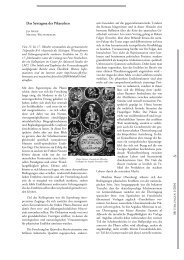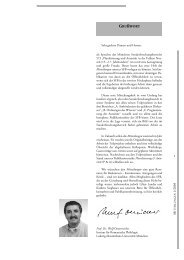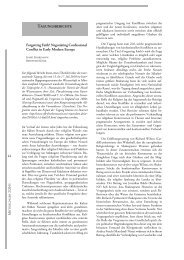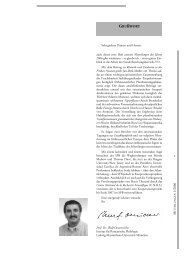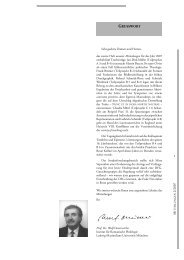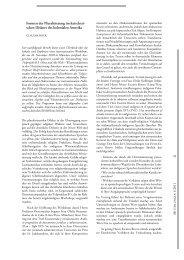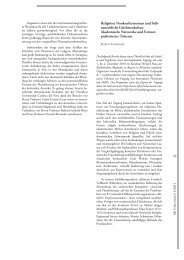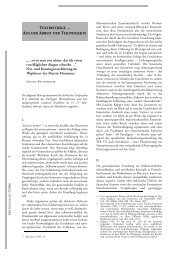Mitteilungen 2-2011_final.fm - SFB 573 - Ludwig-Maximilians ...
Mitteilungen 2-2011_final.fm - SFB 573 - Ludwig-Maximilians ...
Mitteilungen 2-2011_final.fm - SFB 573 - Ludwig-Maximilians ...
Sie wollen auch ein ePaper? Erhöhen Sie die Reichweite Ihrer Titel.
YUMPU macht aus Druck-PDFs automatisch weboptimierte ePaper, die Google liebt.
20<br />
MITTEILUNGEN 2/<strong>2011</strong><br />
processes through which cultural memory is shaped and<br />
organized. Instead of being outside of culture and opposed<br />
to writing, forgetting should be seen as a cultural<br />
force and writing as one of its techniques. 1<br />
Hall’s dedication actually bears this out. For while<br />
it emphatically presents itself and the historiographical<br />
work to follow as an act of remembering, at the same<br />
time this praise of memory performs a double act of<br />
forgetting – and it does so by<br />
means of writing. First, it obliterates<br />
the memory of the rich<br />
mnemonic culture of the Middle<br />
Ages which was predominantly,<br />
if not exclusively, oral in nature.<br />
The theory and practices of the<br />
medieval ars memoria have been<br />
reconstructed by Mary Carruthers<br />
in her groundbreaking<br />
study The Book of Memory<br />
(1990). While the title of her<br />
study would seem to suggest a<br />
similar bias toward »memory by<br />
litterature« as exhibited by Hall,<br />
the ›book of memory‹ is here to<br />
be understood metaphorically: it<br />
refers to the metaphor of waxtablets<br />
as one of the traditional<br />
images for the neuropsychological<br />
processes of remembering.<br />
Since antiquity, memory was<br />
understood as a bodily process<br />
in which perceptions received<br />
through the senses were impressed<br />
in the soft material of the<br />
brain. These impressions were<br />
likened to engravings left by a<br />
stylus in the soft wax on a writing<br />
tablet. A quote by Thomas<br />
Aquinas, highlights the metaphorical<br />
nature of the relation between writing and<br />
memory: »A thing is said metaphorically to be written<br />
on the mind of anyone when it is firmly held in memory.«<br />
2 Yet when Hall speaks of »memory by litterature«,<br />
he takes this metaphor literally: he reifies the medieval<br />
simile that the process of remembering works like the<br />
act of writing into the notion that memory is writing. In<br />
doing so, he narrows the wealth of medieval mnemotechniques<br />
down to only one: memory by the book.<br />
This reliance on literacy seems to me a distinctly<br />
early modern attitude. If I am right, then why did this<br />
shift toward literacy and written record as the privileged<br />
medium of historical memory occur? I would suggest<br />
that one factor that changes the field of mnemonic<br />
Figure 4<br />
Johann Philipp Abelin: ›Theatri Europaei‹ (1629),<br />
frontispiece.<br />
practice considerably in the early modern period is the<br />
advent of print as a technology that facilitates the multiplication<br />
and distribution of books and book knowledge.<br />
This was seen by contemporaries – at least those<br />
directly involved in the emergent print culture – as an<br />
enhancement of personal and cultural memory. William<br />
Caxton, for example, who set up the first printing<br />
press in England, describes the purpose of his 1482 edition<br />
of the Polychronicon, a chronicle written by the<br />
medieval monk Ranulf Higden,<br />
as follows: »such thynges as have<br />
ben don syth the deth or ende of<br />
the sayd boke of polycronicon<br />
[which] shold be had in remembraunce<br />
and not putte in oblyuyon<br />
ne forgetynge.« 3 Caxton sees<br />
his printing enterprise explicitly<br />
in terms of memory and oblivion.<br />
Intriguingly, his choice of<br />
phrasing and tense – »should have<br />
been had in remembrance« –<br />
suggests that the chronicle does<br />
not only store historical treasures<br />
but indeed can restore what had<br />
actually been forgotten. By the<br />
early seventeenth century, the<br />
confident equation of history<br />
and »memory by litterature« had<br />
become a staple of historiographical<br />
discourse. Francis Bacon,<br />
for example, claims in his magisterial<br />
Advancement of Learning<br />
(1623; translated into English<br />
1640): »Assistant to Memory is<br />
writing; and it must by all means<br />
be noted, that Memory of it selfe,<br />
without this support, would be<br />
too weake for prolixe and accurate<br />
matters; wherein it could no<br />
way recover, or recall it selfe, but by Scripture.« 4 Human<br />
memory was deemed not only »too weake« for<br />
more complex matters but also too prone to novelty. The<br />
metaphor of the memory as a wax tablet whose contents<br />
could be erased in order to re-inscribe new ones, illustrates<br />
this disadvantage. Hamlet’s seemingly paradoxical<br />
promise that »from the table of my memory / I’ll<br />
wipe away all trivial fond records« (1.5.98 f.) in order to<br />
remember solely the command to vengeance issued by<br />
his father’s ghost is based on the same mnemonic principle.<br />
Likewise, the Jacobean historiographer Thomas<br />
Gataker stresses that all information imprinted in »the<br />
book and volume of [the] brain« (Hamlet, 1.5.104)<br />
can and will be erased to receive new information.<br />
Unlike a printed book, human memory was »not able to<br />
1. Krämer 2000, 268 f.<br />
2. Summa Theologica, quoted in Carruthers 1990, 8.<br />
3. Caxton 1428, 428.<br />
4. Bacon 1640, 253.



